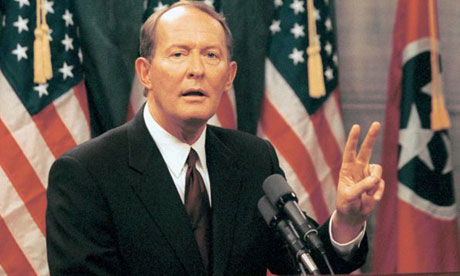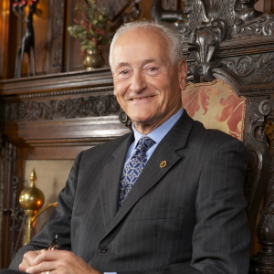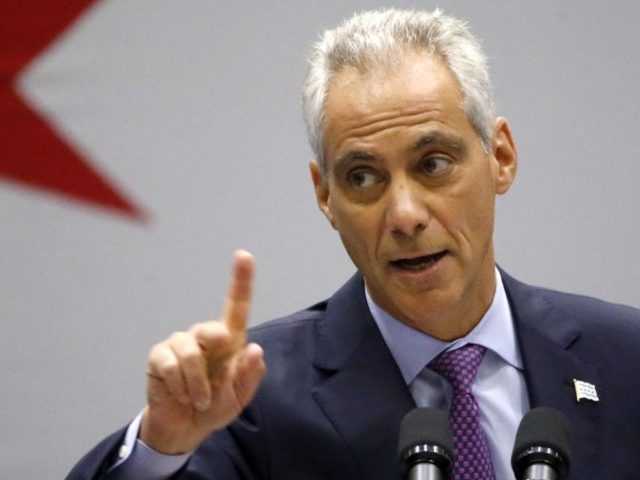Lamar Alexander
Driftwood in a Tsunami
1993-2001
If presented to a Republican decades earlier Lamar Alexander would have been labeled a conservative extremist. But it was no longer the 1950s, it was the 1990s, and that placed Alexander firmly in the moderate wing. Alexander had been a staffer in Washington in his younger days, something that had cost him the Governor’s mansion in Tennessee when he first ran for office, he had worked for Nixon and was running it the wake of Watergate, not a winning combination. But in 1978 he returned with a vengeance, trekking across the state in his trademark flannel shirts and crusading against corruption in the statehouse. This time he won handily. He was sworn in a few days earlier then normal to counter last minute pardons issued by his corrupt predecessor by bipartisan agreement. As Governor he perused a moderate course, increasing funding towards education and state employee paychecks while rapidly cutting regulation. This garnered him the Chairmanship of the National Governor’s Association but gained him few friends from the right of the party.
Barred from a third term he left politics 1988 to 1992, serving as President of the University of Tennessee. He staged an abortive for President in 1992, again in a flannel shirt, but dropped out after faring poorly in Iowa and New Hampshire. He endorsed Arlen Specter, who turned out to be the wrong horse. The party was angry, Bush had been all well and good, but he had not reshaped the country into something more conservative. Bob Dole had been an improvement, but his positions on abortion were suspect and he was honestly too dull. They wanted something new, and they got it from Trent Lott. Lott hadn’t even finished his first Senate term yet, but he spoke to the angry people of America and his “Oath to the People” made for a good stump speech. Now Lott sought to appease the moderates, who were starting to wonder if maybe the Schroeder/Graham ticket was all that bad. So, he turned to Lamar Alexander, his old roommate from when they were both Washington staffers. Alexander accepted. His debate performance was considered a lost, but with Lott defeating Schroeder in all the Presidential debates this was a minor issue. Lott and Alexander still presided over one of the biggest waves in history, the Senate was taken back after years of Democratic rule, and House went to the GOP for the first time since the 50s. Lott had a mandate.
And he used it. Deregulation of the banks, tax cuts, and tort reform came first. Alexander was not uncomfortable with this. Soon things became a flood. The line item veto was passed then struck down by the Supreme Court. Harsher sentencing laws sped through Congress as well. Alexander, despite limited legislative experience, wrangled the balanced budget through the Senate, only to see it flounder in the House under Dick Cheney. After the midterms cut, but not ended, the majorities Lott took on welfare reform. Social Security was to be privatized, and Medicare and Medicaid were block granted with work retirements attached. It took some prodding from President Lott to get Alexander to work for it, but eventually the Vice President relented and helped get the bill passed over the screams of liberals in the Senate. The fight exhausted the Vice President, and he was conspicuously absent from the spending cut fights the followed. Alexander did not exactly oppose the Conservative direction of the White House, but it was all happening too quickly and without much thought. His working relationship with Lott and the Conservative Cabinet was cordial, Alexander was never stopped from speaking his mind, but not filled with love, nobody ever followed his suggestions. He still preformed well in the reelection fight, beating Bob Miller handily in the one debate, but was tired of not being heard.
In foreign affairs he found more agreement with the rest of the cabinet, agreeing that China was the new Soviet Union, the new enemy. Alexander was heavily involved in shipping weapons to the Philippine government, and helped broker talks towards a United Central Asian front against the neo-Maoist menace. He ceremonially welcomed Eastern Europe into NATO. In foreign policy Alexander had found his niche and found it much more useful when the 1998 midterms left the GOP sans House Majority. He was a human face to the conservative administration that so often alienated key allies with ill timed gaffes. Even amongst Democrats aghast at Lott’s revolution. Alexander remained a respected, if not popular, figure.
Despite this new-found influence Alexander declined to run for President in 2000. The Vice Presidency had been a disappointment, and he feared the Democratic frontrunner, who stood head and shoulders above the rest. So, he stood aside, which was just as well for the conservative wing whose standard bearer Orrin Hatch won the primaries, only to lose in November. Many Republicans blame Alexander not running for losing the 2000 election, although the truth in that matter is often hard to determine.
Post Vice Presidency Alexander has been active in campaigning for Republicans across the nation and has become a member of several foreign policy think tanks. He has become friends with Bill Brock, a fellow two term Tennessee Vice President who was not nominated for the White House when the term was up. Despite the parallels Alexander’s successor at Number One Observatory Circle would not follow the path laid out by Walter Mondale or Bob Graham.








